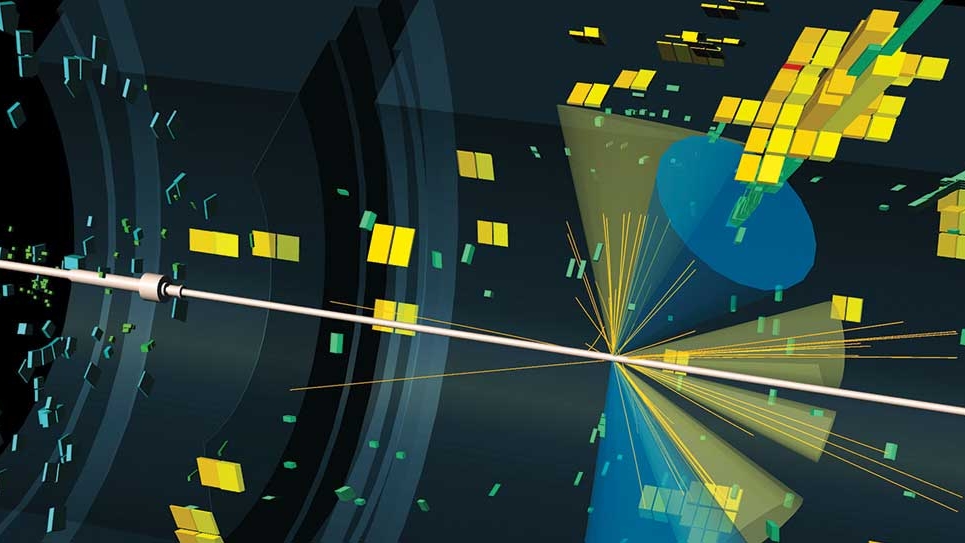
A candidate event in which a Higgs boson is produced in conjunction with top and anti-top quarks which decay to jets of particles. Image: CERN
As part of the process of bringing a new supercomputer into production, the ALCF conducts its Early Science Program (ESP) to ensure the facility’s next-generation systems are ready for science on day one.
The intent of the ESP is to provide research teams with critical pre-production computing time and resources to prepare key applications for the architecture and scale of a new supercomputer, and to solidify libraries and infrastructure to pave the way for other production applications to run on the system. In addition to fostering application readiness, the ESP allows researchers to pursue innovative computational science projects not possible on today’s leadership-class supercomputers.
The current phase of ESP is now targeting the ALCF's upcoming exascale system, Aurora. Through an open call for proposals, the ALCF program has awarded pre-production computing time and resources to projects spanning the three "pillars" of the ALCF mission: simulation, data, and learning.
Each ESP team is made up of application developers, domain science experts, and an ALCF postdoctoral appointee. In collaboration with experts from Intel and HPE, ALCF staff is helping to train the teams on the Aurora hardware design and how to program it.
Together, the projects are investigating a wide range of computational research areas critical to enabling science in the exascale era. This includes mapping and optimizing complex workflows, exploring new machine learning methodologies, stress-testing I/O hardware, and other emerging technologies, and enabling connections to large-scale experimental data sources, such as CERN’s Large Hadron Collider, for analysis and guidance.
Design and Evaluation of High-Efficiency Boilers for Energy Production Using a Hierarchical V/UQ Approach, PI Martin Berzins, The University of Utah
From Quantum Monte Carlo to Foundation Models: Exascale-Driven Electronic Structure for Targeted Drug Discovery, PI Anouar Benali, Qubit Pharmaceuticals
Extreme-Scale Cosmological Hydrodynamics, PI Katrin Heitmann, Argonne National Laboratory
Extreme-Scale Unstructured Adaptive CFD, PI Kenneth Jansen, University of Colorado at Boulder
Free Energy Landscapes of Membrane Transport Proteins, PI Benoit Roux, University of Chicago
High-Fidelity Simulation of Fusion Reactor Boundary Plasmas, PI C.S. Chang, Princeton Plasma Physics Laboratory
Lattice Quantum Chromodynamics Calculations for Particle and Nuclear Physics, PI Paul Mackenzie, Fermilab
Metascalable Layered Materials Genome, PI Aiichiro Nakano, University of Southern California
NWChemEx: Tackling Chemical, Materials, and Biochemical Challenges in the Exascale Era, PI Theresa Windus, Iowa State University and Ames Laboratory
Data Analytics and Machine Learning for Exascale Computational Fluid Dynamics, PI Ken Jansen, University of Colorado Boulder
Dark Sky Mining, PI Salman Habib, Argonne National Laboratory
Exascale Computational Catalysis, PI David Bross, Argonne National Laboratory
Extreme-Scale In-Situ Visualization and Analysis of Fluid-Structure-Interaction Simulations, PI Amanda Randles, Duke University and Oak Ridge National Laboratory
Simulating and Learning in the ATLAS Detector at the Exascale, PI Walter Hopkins, Argonne National Laboratory
Accelerated Deep Learning Discovery in Fusion Energy Science, PI William Tang, Princeton Plasma Physics Laboratory
Enabling Connectomics at Exascale to Facilitate Discoveries in Neuroscience, PI Nicola Ferrier, Argonne National Laboratory
Machine Learning for Lattice Quantum Chromodynamics, PI William Detmold, Massachusetts Institute of Technology
Many-Body Perturbation Theory Meets Machine Learning to Discover Singlet Fission Materials, PI Noa Marom, Carnegie Mellon University
Virtual Drug Response Prediction, PI Rick Stevens, Argonne National Laboratory
To facilitate the development of community software tools and libraries critical to Aurora, especially those needed by applications in ESP projects, ALCF awarded and manages a special omnibus project: the Aurora Tools and Libraries Project. Scott Parker serves as coordinating PI, with multiple PIs leading individual development projects. This team of teams shares the same early access to information, software, and hardware as the applications ESP projects, and works collaboratively with ALCF and the vendors.